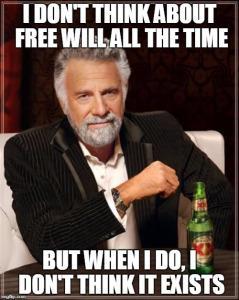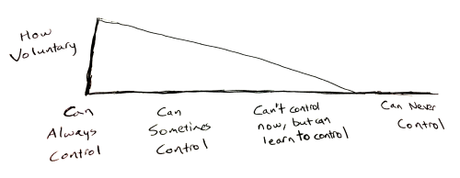Just listened to Neuroscientist Robert Sapolsky talk about free will on Sam Harris’s podcast. Neither of them believe in it, and neither do I.

It started in high school with a thought experiment: if you rewound your life and woke up again this morning, with no memory of the day, would you do the same things?
Please stop and think about this scenario for a second. If you reset to this morning with your memory wiped would you have the same day?
If you said yes, then let’s rewind a week, a month, a year, all the way back to when you were born, your life is predestined. That’s it, we don’t need to talk about brains or consciousness or anything like that, just follow simple logic.
Okay, so what if you said no? So given the exact same history up until this morning, given the exact same events going on around you, you made different decisions? So you don’t make the best decision given the scenario, you just behave randomly. Again, you don’t have free will. You don’t live in a pre-determined world, you live in an utterly random one.
But it feels like there’s free will, doesn’t it? Voluntary Actions
It feels like some actions are voluntary while others we can’t.
I think a lot of what people think is voluntary, just has to do with to what degree that action can be modified by language or thoughts.
Something feels voluntary, if when we tell someone to stop doing it, or it’s in their best interest to stop doing it, they’re able to.However, it’s often hard to tell whether or not someone else (or even we, ourselves) are able to control a behavior — for example, is an alcoholic really able to stop drinking if he just wants to enough? We know some alcoholics stop drinking, which could make you think it’s possible for anyone to stop drinking at any time if they just cared enough, but at the same time we know other alcoholics die of alcohol poisoning before recovering. It’s really impossible to know if an individual can quit now, or later, given their situation.

So is it worth moralizing and lecturing your alcoholic friend? Maybe your shame is exactly what they need to overcome their drinking, maybe it’s counter-productive. That’s an empirical question — finding out whether an average shaming to an average person is anyways.
Maybe your words can tip them over the edge into the realm of voluntary realm, if not today, then tomorrow when they sober up, or maybe your words will help by set off a complicated biochemical cascade in your friend’s brain, but their effects won’t manifest into a gain of control for months.
But in the end it doesn’t really matter what’s “voluntary” and what’s not, because the words and thoughts that lead to “voluntary” actions themselves were predetermined or random. I don’t know how this doesn’t just end in nihilism.
Personally, the way I get by with this terrible life philosophy is to pretend it doesn’t apply to me because otherwise you get stuck in really circular, unproductive thinking. I do essentially try to act though as if what I’ve outlined above is true of everyone else in the world. I do think we’re conscious, I think we all have feelings, but I think we’re all pinballs bouncing around a chaotic world.
The one silver lining, is I do think it’s increased my compassion for people — we’re all in this together, even people you disagree with in every way, or people who’ve done terrible things. But on the other hand, some studies have shown that people may use a belief in predeterminism to morally let themselves off the hook (Vohs and Schooler, 2008). Well, if spreading this anti-fw gospel is amoral, I’m going to let myself off the hook because I didn’t have a choice in the matter anyways.
Hopefully people much smarter than me have figured a way out of this logical black hole, and have arguments convincing enough to take me out of it’s orbit.
Nobody exists on purpose, nobody belongs anywhere, everybody’s going to die. Come watch TV. – Rick and Morty
Advertisements
